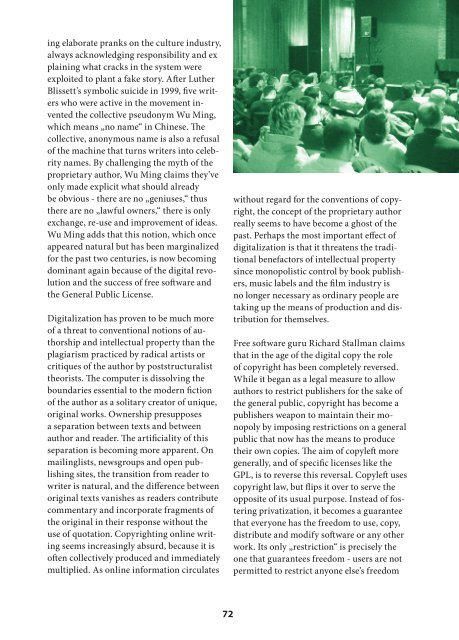You also want an ePaper? Increase the reach of your titles
YUMPU automatically turns print PDFs into web optimized ePapers that Google loves.
ing elaborate pranks on the culture industry,<br />
always acknowledging responsibility and ex<br />
plaining what cracks in the system were<br />
exploited to plant a fake story. After Luther<br />
Blissett’s symbolic suicide in 1999, five writers<br />
who were active in the movement invented<br />
the collective pseudonym Wu Ming,<br />
which means „no name“ in Chinese. The<br />
collective, anonymous name is also a refusal<br />
of the machine that turns writers into celebrity<br />
names. By challenging the myth of the<br />
proprietary author, Wu Ming claims they’ve<br />
only made explicit what should already<br />
be obvious - there are no „geniuses,“ thus<br />
there are no „lawful owners,“ there is only<br />
exchange, re-use and improvement of ideas.<br />
Wu Ming adds that this notion, which once<br />
appeared natural but has been marginalized<br />
for the past two centuries, is now becoming<br />
dominant again because of the digital revolution<br />
and the success of free software and<br />
the General Public License.<br />
Digitalization has proven to be much more<br />
of a threat to conventional notions of authorship<br />
and intellectual property than the<br />
plagiarism practiced by radical artists or<br />
critiques of the author by poststructuralist<br />
theorists. The computer is dissolving the<br />
boundaries essential to the modern fiction<br />
of the author as a solitary creator of unique,<br />
original works. Ownership presupposes<br />
a separation between texts and between<br />
author and reader. The artificiality of this<br />
separation is becoming more apparent. On<br />
mailinglists, newsgroups and open publishing<br />
sites, the transition from reader to<br />
writer is natural, and the difference between<br />
original texts vanishes as readers contribute<br />
commentary and incorporate fragments of<br />
the original in their response without the<br />
use of quotation. Copyrighting online writing<br />
seems increasingly absurd, because it is<br />
often collectively produced and immediately<br />
multiplied. As online information circulates<br />
72<br />
without regard for the conventions of copyright,<br />
the concept of the proprietary author<br />
really seems to have become a ghost of the<br />
past. Perhaps the most important effect of<br />
digitalization is that it threatens the traditional<br />
benefactors of intellectual property<br />
since monopolistic control by book publishers,<br />
music labels and the film industry is<br />
no longer necessary as ordinary people are<br />
taking up the means of production and distribution<br />
for themselves.<br />
Free software guru Richard Stallman claims<br />
that in the age of the digital copy the role<br />
of copyright has been completely reversed.<br />
While it began as a legal measure to allow<br />
authors to restrict publishers for the sake of<br />
the general public, copyright has become a<br />
publishers weapon to maintain their monopoly<br />
by imposing restrictions on a general<br />
public that now has the means to produce<br />
their own copies. The aim of copyleft more<br />
generally, and of specific licenses like the<br />
GPL, is to reverse this reversal. Copyleft uses<br />
copyright law, but flips it over to serve the<br />
opposite of its usual purpose. Instead of fostering<br />
privatization, it becomes a guarantee<br />
that everyone has the freedom to use, copy,<br />
distribute and modify software or any other<br />
work. Its only „restriction“ is precisely the<br />
one that guarantees freedom - users are not<br />
permitted to restrict anyone else’s freedom


